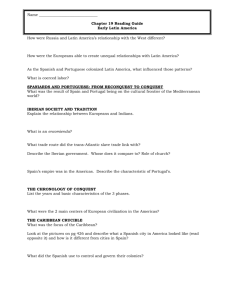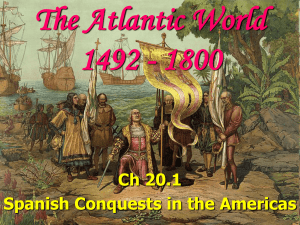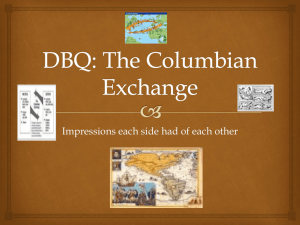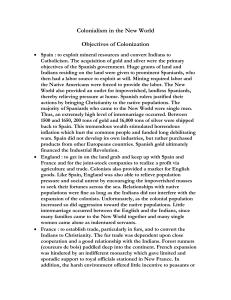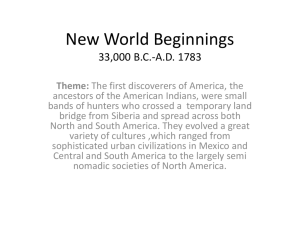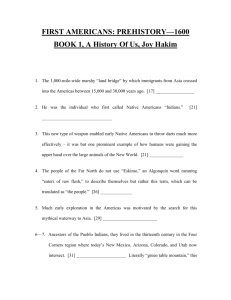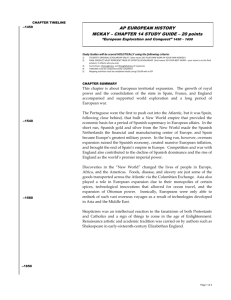2. THE SPANISH CONQUEST Students are responsible for class material.
advertisement
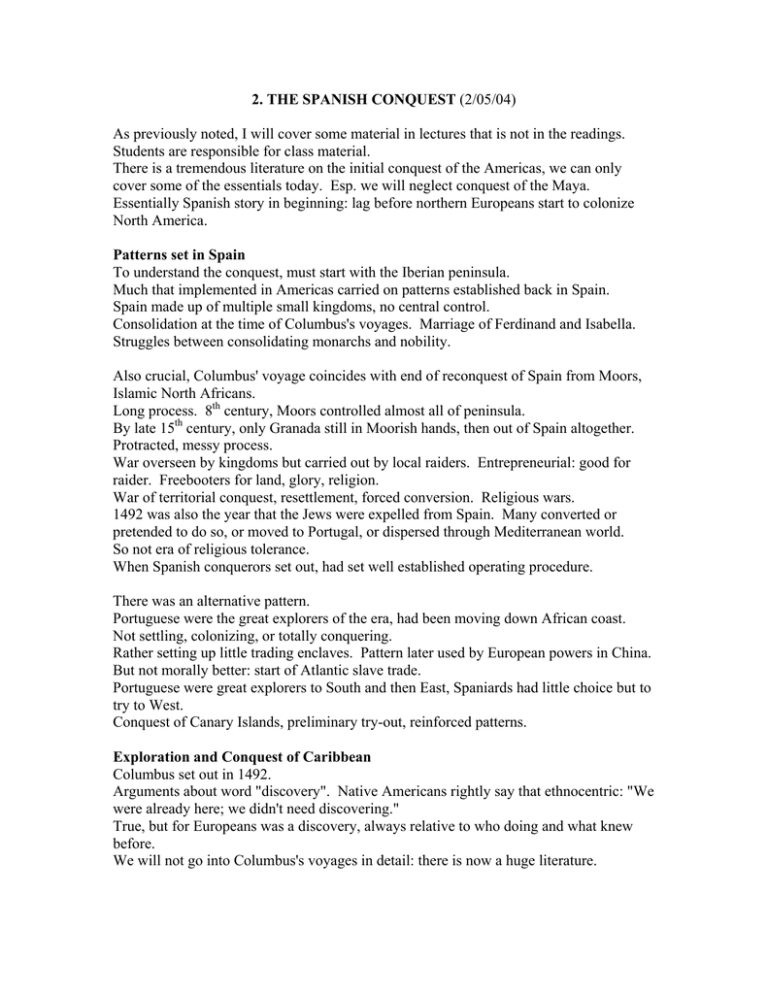
2. THE SPANISH CONQUEST (2/05/04) As previously noted, I will cover some material in lectures that is not in the readings. Students are responsible for class material. There is a tremendous literature on the initial conquest of the Americas, we can only cover some of the essentials today. Esp. we will neglect conquest of the Maya. Essentially Spanish story in beginning: lag before northern Europeans start to colonize North America. Patterns set in Spain To understand the conquest, must start with the Iberian peninsula. Much that implemented in Americas carried on patterns established back in Spain. Spain made up of multiple small kingdoms, no central control. Consolidation at the time of Columbus's voyages. Marriage of Ferdinand and Isabella. Struggles between consolidating monarchs and nobility. Also crucial, Columbus' voyage coincides with end of reconquest of Spain from Moors, Islamic North Africans. Long process. 8th century, Moors controlled almost all of peninsula. By late 15th century, only Granada still in Moorish hands, then out of Spain altogether. Protracted, messy process. War overseen by kingdoms but carried out by local raiders. Entrepreneurial: good for raider. Freebooters for land, glory, religion. War of territorial conquest, resettlement, forced conversion. Religious wars. 1492 was also the year that the Jews were expelled from Spain. Many converted or pretended to do so, or moved to Portugal, or dispersed through Mediterranean world. So not era of religious tolerance. When Spanish conquerors set out, had set well established operating procedure. There was an alternative pattern. Portuguese were the great explorers of the era, had been moving down African coast. Not settling, colonizing, or totally conquering. Rather setting up little trading enclaves. Pattern later used by European powers in China. But not morally better: start of Atlantic slave trade. Portuguese were great explorers to South and then East, Spaniards had little choice but to try to West. Conquest of Canary Islands, preliminary try-out, reinforced patterns. Exploration and Conquest of Caribbean Columbus set out in 1492. Arguments about word "discovery". Native Americans rightly say that ethnocentric: "We were already here; we didn't need discovering." True, but for Europeans was a discovery, always relative to who doing and what knew before. We will not go into Columbus's voyages in detail: there is now a huge literature. Were important recent advances in navigation and ship-building that made voyages possible. As is well known, Columbus wanted to find Asia. No one involved thought the world was flat. In 1492 he made land on the Bahamas, met some Indians Came back to Spain, much more interest in his work , second expedition got much more support from monarchs, 18 ships, 1200 men instead of 87. Succession of voyages, Caribbean, then on to mainland. Two important negotiations followed. Columbus made a deal with monarchs, titles, nobility, made governor.. But he was a lousy governor, Crown not eager to have new nobility. Changed over to royal control. More momentous in 1494. Spanish monarchy with Church. Famous line to demarcate claims of Spain and Portugal. Famous mistake, gave Portugal great expanse in South America. Monarchs justified what did in New World by papal grant but also by other claims. Also gave monarchs considerable say in church affairs. So at beginning of 16th century Spain moved into the Caribbean. Indians easily conquered. Great shock of difference, nakedness of Indians. Justly famous colonial encounter. And most of all, claim that some cannibals. Evidence for this actually very slight. Didn't interrupt cannibal feast or find choice cuts left over. Still debated today. If there were cannibals, it was not major source of food, more likely to have been ritualized. We will discuss further later. Columbus said there were two kinds of Indians: the first nice, welcoming, docile. Now identified as Arawaks, Tainos; second nasty brutish cannibals, Caribs. Linguistic origin of Caribbean, cannibal, and Shakespeare's Caliban. Distinction between two groups mostly spurious. Ended up that any peoples who resisted fiercely branded Caribs. The conquest and settlement of Caribbean was just as nasty, disastrous as Las Casas says in readings: Little gold there, soon looted. Nothing to exploit but Indian labor, enslaved them. Disastrous effects of disease and mistreatment on native population. Soon exterminated, died in masses. It soon became clear that the conquerors were not unified, that were different interests and groups. Messy conglomeration not well-oiled machine. 1. conquistadores. Mostly commoners and minor gentry, few real nobility. Myth of Spanish army, never existed. More like collection of ragtag mercenaries, not even real soldiers. Goal to make a quick fortune, retire, return to Spain. Cortes the great success story, few others succeeded; at best, did well economically but had to stay in Americas 2. The Spanish crown, which didn't want Indians destroyed, for both humanitarian and practical reasons. Also wanted to rein in conquerors, but hard to do. Had to keep them happy. Also need to stabilize situation in great flux. 3. The Catholic Church. was an agent of the crown but also had its own goals. It was often at odds with secular settlers, condemned their abuses. As soon as 1500, Isabella persuaded to abolish slave trade, declared Indians essentially free. There was an escape clause: Carib/cannibals were not protected. Meant that all one had to do was declare a people Caribs to declare open season on them. 1503 established system by which crown passed out rights to exploit Indian labor, based partly on model from reconquista. Discussed in later lecture: kept under centralized control, was a direct grant from crown, could be taken back; was at best for holder's life, couldn't be inherited---wanted to discourage hereditary nobility Total disappearance of Indians in Caribbean encouraged replacement with African slaves Also start looking further for lands to conquer and exploit. Darién, eastern end Isthmus of Panama, In 1513 Balboa sees Pacific. Balboa slightly better class of conqueror, only brutalizes Indians some of time. Replaced and executed by Pedrarias D'Avila, who worst sort of brute. 1519 founded Panama City. As expanded out, not juggernaut, steamroller. Rather improvised, small scale. Collection of semi-professional mercenaries. Often tied by kinship or from same province in Spanish. Leader puts together group. Find a few "ships" (very small), and a little financing, a few horses and guns. Often, as with Balboa and Cortes, dubious backing from authorities. So both official and entirely voluntary and improvised. Conquest of Mexico 1519-1522. Importance of intermediaries, translators. Famous translator, "La Malinche". Reviled for centuries. Conquest impossible without support from native allies, especially Tlaxcalans. Interaction of Cortes with Moctezuma. Massacres, Spanish retreat. Smallpox epidemic reduced Aztecs. Conquest of Peru: Pizarro preceded by epidemic. Inca divided by civil war. Capture of Inca emperor. Patterns of Conquest. Why did Spaniards win? Established interpretation that Aztecs mentally overwhelmed, could only see Spaniards as gods very dubious. Standard operating procedure, included capture of leader and exemplary, terrifying violence, exploitation of divisions in native population. Horses and dogs, especially psychological effect. Controversies about effectiveness of guns. Crucial importance of steel edged weapons, armor, and in Mexico, ship-building. Weaknesses of native opponents: demoralized, unready for new threat, not as singleminded and ruthless, internally divided. Crucial importance of epidemics. Might have turned out differently: Indian successes where learned to counter cavalry. Even where successful conquest, does not mean absolute control and domination. Often partial, shaky. Consolidation of Conquest Some regions extended struggle, especially with Maya and "neo-Inca" holdouts. Problem for authorities of controlling conquering soldiers as well as conquered. Unruly conquistadores, civil war in Peru Policy most places of consolidation, group into towns and cities where scattered Increased effects of European epidemic diseases, tremendous depopulation Separate Spaniards and Indians Give Spaniards rights to exploit Indian labor, but not hereditary rights. Specified grants of goods and labor from particular communities. Trying to retain overall control by Spanish crown and prevent development of hereditary aristocracy. Clergy in missionary orders like Dominicans and Franciscans to Indians, "secular" clergy outside orders to Spaniards. Extended period of reorganization.
